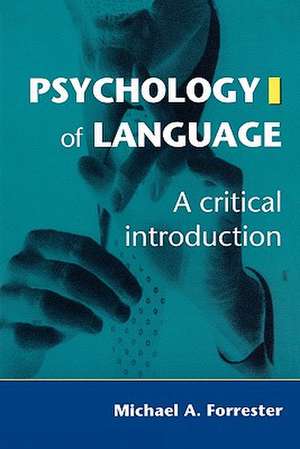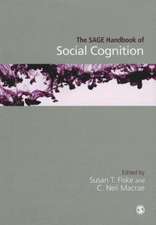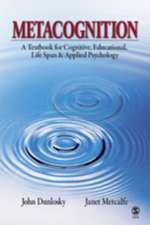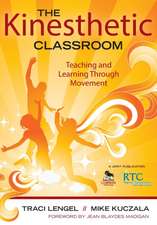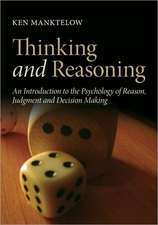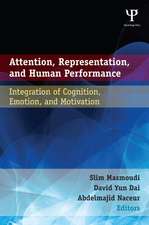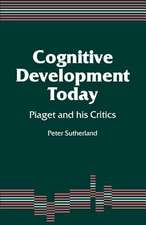Psychology of Language: A Critical Introduction
Autor Michael Forresteren Limba Engleză Paperback – 10 mar 1996
This comprehensive textbook brings together diverse themes on the psychology of language in an integrated way. Rather than covering only the formal-structural aspects of language, Forrester provides a broad view of the study of language across various perspectives, focusing throughout on interesting relationships between language and human psychological processes.
The book provides a clear introduction to key topics from language structure and processing, semantics and cognitive science, to conversation analysis, reading and writing, power relations in communication and postmodern psychology.
The author explores language by considering three themes: thinking - the cognitive processes of self-communication; talk - where the emphasis is on everyday conversational behaviour; and text - including the study of reading and writing. A coherent framework is developed by looking at topics which link the themes together, clearly demonstrating the relationship between language and communication processes.
Preț: 473.30 lei
Preț vechi: 556.83 lei
-15% Nou
Puncte Express: 710
Preț estimativ în valută:
90.58€ • 94.32$ • 76.55£
90.58€ • 94.32$ • 76.55£
Carte tipărită la comandă
Livrare economică 10-24 martie
Preluare comenzi: 021 569.72.76
Specificații
ISBN-13: 9780803979918
ISBN-10: 0803979916
Pagini: 224
Ilustrații: 1
Dimensiuni: 156 x 234 x 12 mm
Greutate: 0.32 kg
Ediția:1
Editura: SAGE Publications
Colecția Sage Publications Ltd
Locul publicării:London, United Kingdom
ISBN-10: 0803979916
Pagini: 224
Ilustrații: 1
Dimensiuni: 156 x 234 x 12 mm
Greutate: 0.32 kg
Ediția:1
Editura: SAGE Publications
Colecția Sage Publications Ltd
Locul publicării:London, United Kingdom
Recenzii
`Forrester's book succeeds in outlining a fuller psychology of language, one that foregroundss the communication functions of language. I hope it spurs other works of that kind' - Theory and Psychology
`An attempt to reconcile the different facets of the contemporary study of the psychology of language... this is a daring attempt to point out the diversity and lurking disintegration of the field of psychology of language...Throughout the endeavour, the suggestion is made that the psuchology of language would profit from a focus on conversation in which researchers immerse themselves into the language scene instead of looking at it from a distance...The book is appealing in its attempt to approach the psychology of language from a wide range of often controversial viewpoints...Forrester's book is a book of reflection. The work constitutes a nice addition to the alternative book library of the advanced graduate student or academic' - Contemporary Psychology
`Forrester's book provides an account not of the field of psycholinguistics as traditionally conceived, but rather of the author's vision for its future development... Forrester argues that traditional psycholinguistics, having been dominated by cognitivism and structuralism, has little to offer to those who aim to understand language as communication. To rectify this, the psychology of language should extend its domain of inquiry and become more closely integrated with alternative approaches to the study of language, both from other areas of psychology and from other disciplines... The scope of Forrester's book is impressively wide... there is a strong emphasis throughout on the philosophy, history and sociology of science... His book can be likened to a large-scale map with a few inset boxes containing smaller-scale plans - designed for the traveller who is considering going to neighbouring lands and wants to get a flavour of what it will be like there. For this reason, the book is well suited to senior undergraduates, postgraduates and researchers, particularly those who already have a sound knowledge of one field of language study and are interested in exploring allied fields. Such readers will be likely to find Forrester's book a thought-provoking, challenging introduction to alternative theoretical and methodological approaches. It would, for example, make an excellent resource for discussion in honours tutorials/seminars... Forrester presents a persuasive case for the need to integrate diverse approaches to the study of language, and he successfully highlights many of the gaps and potential conflicts between these' - British Journal of Psychology
`An attempt to reconcile the different facets of the contemporary study of the psychology of language... this is a daring attempt to point out the diversity and lurking disintegration of the field of psychology of language...Throughout the endeavour, the suggestion is made that the psuchology of language would profit from a focus on conversation in which researchers immerse themselves into the language scene instead of looking at it from a distance...The book is appealing in its attempt to approach the psychology of language from a wide range of often controversial viewpoints...Forrester's book is a book of reflection. The work constitutes a nice addition to the alternative book library of the advanced graduate student or academic' - Contemporary Psychology
`Forrester's book provides an account not of the field of psycholinguistics as traditionally conceived, but rather of the author's vision for its future development... Forrester argues that traditional psycholinguistics, having been dominated by cognitivism and structuralism, has little to offer to those who aim to understand language as communication. To rectify this, the psychology of language should extend its domain of inquiry and become more closely integrated with alternative approaches to the study of language, both from other areas of psychology and from other disciplines... The scope of Forrester's book is impressively wide... there is a strong emphasis throughout on the philosophy, history and sociology of science... His book can be likened to a large-scale map with a few inset boxes containing smaller-scale plans - designed for the traveller who is considering going to neighbouring lands and wants to get a flavour of what it will be like there. For this reason, the book is well suited to senior undergraduates, postgraduates and researchers, particularly those who already have a sound knowledge of one field of language study and are interested in exploring allied fields. Such readers will be likely to find Forrester's book a thought-provoking, challenging introduction to alternative theoretical and methodological approaches. It would, for example, make an excellent resource for discussion in honours tutorials/seminars... Forrester presents a persuasive case for the need to integrate diverse approaches to the study of language, and he successfully highlights many of the gaps and potential conflicts between these' - British Journal of Psychology
Cuprins
Introduction
Language Structure and the Significance of Recursion
Semantics
The Concept of Meaning
Deixis
The Interface between Language and Social Interaction
Conversational Analysis and Accountability in Everyday Talk
Processes and Procedures in Conversational Interaction
Power Relations in Language
Sign Systems and Social Semiotics
The Role of the Reader in Text Interpretation
Writing and the Construction of Narrative Text
Post-Modern Psychology and Language
Discourse Analysis and Social Psychology
Language Structure and the Significance of Recursion
Semantics
The Concept of Meaning
Deixis
The Interface between Language and Social Interaction
Conversational Analysis and Accountability in Everyday Talk
Processes and Procedures in Conversational Interaction
Power Relations in Language
Sign Systems and Social Semiotics
The Role of the Reader in Text Interpretation
Writing and the Construction of Narrative Text
Post-Modern Psychology and Language
Discourse Analysis and Social Psychology
Notă biografică
Descriere
This comprehensive textbook brings together diverse themes on the psychology of language in an integrated way. Rather than covering only the formal-structural aspects of language, Forrester provides a broad view of the study of language across various perspectives, focusing throughout on interesting relationships between language and human psychological processes. The book provides a clear introduction to key topics from language structure and processing, semantics and cognitive science, to conversation analysis, reading and writing, power relations in communication and postmodern psychology.
